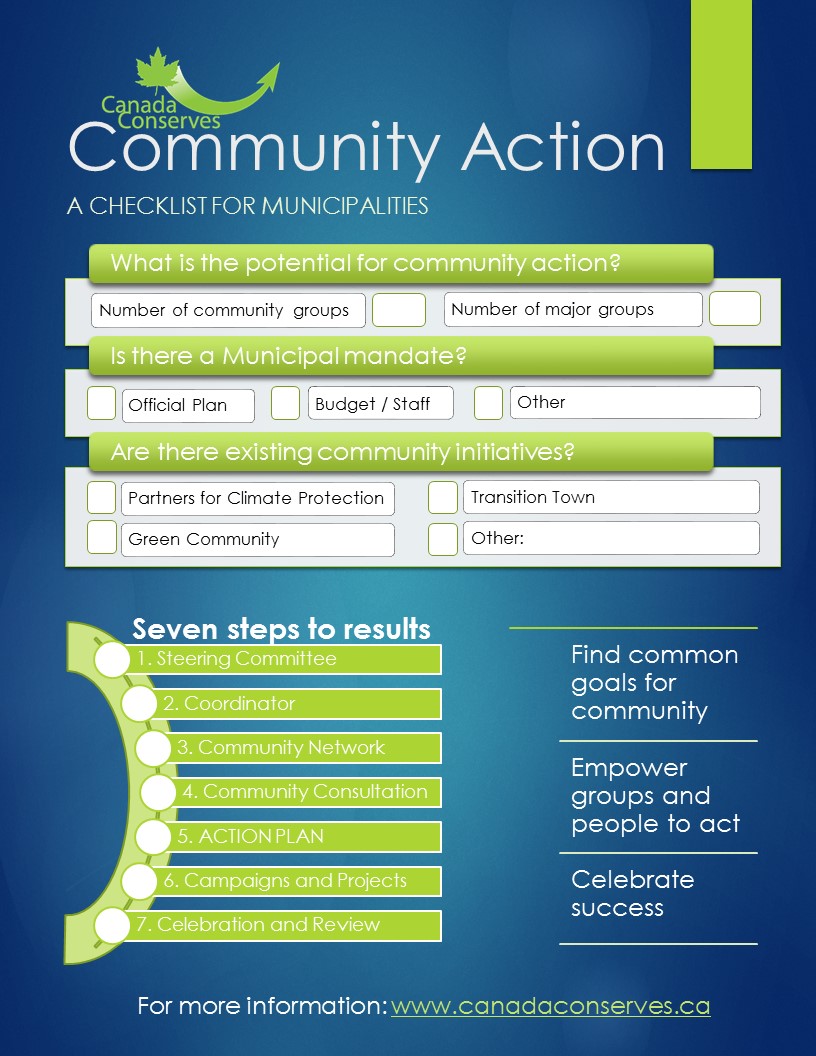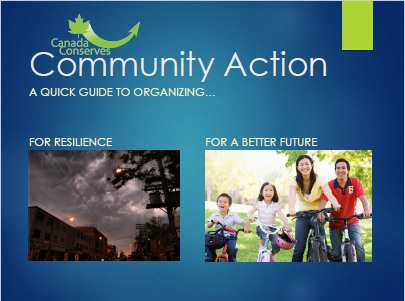Community Action: Feet on the Ground
 Community groups and individual volunteers offer one of the most valuable resources for promoting sustainable development and climate action: feet on the ground. And yet, they are one of the most overlooked aspects of organizing.
Community groups and individual volunteers offer one of the most valuable resources for promoting sustainable development and climate action: feet on the ground. And yet, they are one of the most overlooked aspects of organizing.
They shouldn’t be. Community groups are the voice of the public, a direct link to citizens, and a tremendous resource for community projects.
Organizing for community action shouldn’t be difficult either. The seven basic steps we recommend are:
- set up a steering committee
- appoint or hire a coordinator
- develop a community network of organizations and leaders
- host a workshop or community consultation
- draft an action plan
- help resource the community projects and campaigns
- celebrate your successes and review your plan regularly.
Take a look at the checklist for community action. Would you say your community is well-organized? If not, why? You can download our checklist for community planning meetings (either with the blue background or with no background for photocopying,
Interested in Organizing your Community

We can help.
Take a look at our powerpoint presentation on Community Action. Our emphasis is on a simple and flexible process that allows you to get moving on projects as soon as possible.
And if you need advice or help in organizing, why not start with a Community Action Review – an overview of the potential for community action in your municipality?
Two Examples: Cambridge and Peterborough
Organizing for community action can be simple or involved. The process is the same, it just depends how much energy and resources you wish to invest. Here’s two examples, both of which started up in the early 1990s and both are active today. The City of Cambridge used the community action model back in 1993, and has been running community workshops and projects ever since. The City of Peterborough started even earlier, and has increased the level of intensity of its efforts over a twenty year period.
Cambridge City Green Strategy
Cambridge City Green is a subcommittee of the Council-appointed Cambridge Environmental Advisory Committee (CEAC).
City Green was initially established after the need for a community-based volunteer environmental organization was identified in the 1993 City Green Strategy report. Since then, City Green volunteers have developed awareness materials and articles, conducted plant rescues, planting and restoration projects such as Cambridge Stewardship, annual litter clean ups, volunteer recognition awards, and an annual event.
The goal of City Green is to encourage and coordinate individual and collective action in support of the environment, by promoting lifestyle changes and participation in community-based projects. City Green members meet monthly to plan annual events, Cambridge Stewardship tree plantings, litter clean ups, movie nights, and develop new projects.
Since 2007, the Cambridge Stewardship has coordinated volunteers from 70+ groups. These are the results (2007-2014, 8 years):
- 9,000 stems planted to date (3,507 trees / 1,492 shrubs / 3,989 wildflowers)
- 150+ native species have been established at 21 sites across the city
- 75 planting events have hosted well over 2,500 volunteers from over 70 groups;
- 09 acres (10.56 hectares) and 939 linear riparian metres enhanced
- For every $1 City funds ($42,021 in total), community partners contributed $3.59 ($150,855).
- The City’s $161,671 cash and in-kind contributions have leveraged $376,709 from funding partners, community groups, and volunteers over the past 8 years
- 4 tonnes GHG sequestered; 8.77 tonnes per year until 2090s
Sustainable Peterborough
- The first forum, ’Our Common Future’ , was held in 1989, bringing together over 200 community members to discuss our collective future and share our vision and suggestions for local action.
- A follow-up forum was held in 1991. The City of Peterborough’s Mayor, Sylvia Sutherland, responded positively to a community request and formed the Mayor’s Committee on Sustainable Development.
- The Mayor’s Committee worked from 1990 to 1992 to further refine the agenda on sustainability and promote implementation by identifying priorities, increasing knowledge and awareness, and building stronger links between our citizens, organizations, businesses, and government.
- In 1990 a sub-committee of the Mayor’s Committee, in collaboration with members of the community, developed the Sustainable Development Task Force Report, identifying numerous recommendations to encourage action and provide further direction for the future. Peterborough Green-Up was established in 1992 as a result of the recommendations of the Task Force Report.
- Vision 2020, completed in 1996, brought key sustainability concepts to a wider business audience.
- In 2000, the Peterborough Sustainability Network was formed, a network of academics and environmental professionals intended to explore policy issues.
- By 2006, a small group of the Peterborough Sustainability Network members were meeting for breakfast monthly to try to capture the attention of key leaders in the region. The Network asked the Mayor to host other Members of Council as well as City and County staff in a workshop on sustainability in early 2007. The Councils of the City and County of Peterborough then decided to support a regional sustainability planning initiative beginning in 2007 and involving City and County staff, environmentalists, retirees, educators, students, and members of the business community. The Prosperity Round Table also continued the discussion on sustainability amongst the business community.In 2009, ‘Sustainable Peterborough’ received City of Peterborough project funding, complemented with additional funding from the Federation of Canadian Municipalities, Canada’s Rural Partnership, the Ontario Trillium Foundation, and the Community Foundation of Greater Peterborough. More than 20 years after the community’s first conversation on sustainability, Lura Consulting, in association with Hardy Stevenson and Associates Limited and Grant Consulting, was hired to facilitate the development of the Sustainable Peterborough Plan. The Sustainable Peterborough Plan is the culmination of 18 months of collaboration, engagement and hard work, marking the shift from planning to doing.
- Sustainable Peterborough is currently working on a climate action plan with the City to reduce local contributions to climate change and prepare the community for present and future changes.
Additional Resources
For more information on organizing for community action:
- The Conservation Council of Ontario’s guide to Community Action Plans
- Transition Towns
- Green Communities Canada
[stextbox id=”info” caption=”Coordinating our Efforts ” shadow=”true”]
Interested in developing a Canadian Community Action Partnership? We are currently seeking partners and sponsors for a national initiative to build community capacity and to co-market community-based solutions. Please contact us for details.
[/stextbox]